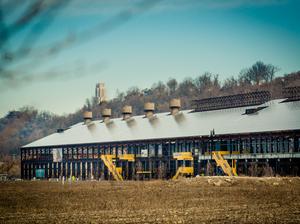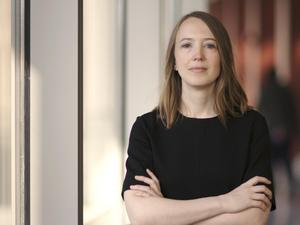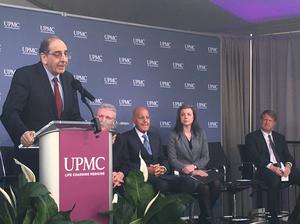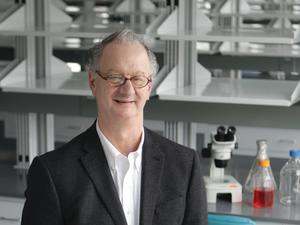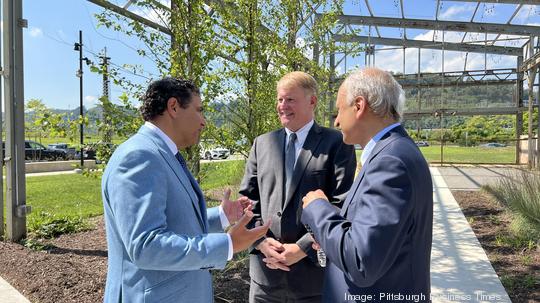
Thursday's University of Pittsburgh and ElevateBio announcement isn't just about jobs and economic development. It will, its principals say, not only elevate Pittsburgh's profile in the biotech industry, but it'll also lead to decades of Pittsburgh medical innovations.
"It boils down to this: Saving lives, creating jobs and cementing Pittsburgh's national leadership in innovation and manufacturing," said Sam Reiman, director of the Richard King Mellon Foundation that last year donated $100 million to help create the BioForge biotech manufacturing facility. ElevateBio announced Thursday it would be locating one of its state-of-the-art biotech manufacturing facilities at BioForge, which is located at the Hazelwood Green redevelopment.
The 250,000-square-foot building will employ about 170 high-paying and high-tech jobs when it opens in early 2026. It will give Pittsburgh what it has lacked as its research and innovation chops have grown: A way to keep homegrown innovations and companies here instead of losing them to other biotech centers.
ElevateBio is a leader in cell and gene therapies, relatively new biological advances that transfer genetic material or cells to not only treat diseases, but also, essentially, address the underlying genetic changes that caused the disease in the first place. That includes CAR-T and Natural Killer cell therapies, as well as others that are on the cutting edge of treatment for cancers and other diseases.
ElevateBio has expertise in process development and manufacturing and will bring that to Pittsburgh in the new facility, the Pitt BioForge BioManufacturing Center at Hazelwood Green. That high-tech facility will include gene editing as well as cell, vector and protein engineering. That will enable ElevateBio and the Pittsburgh companies that use it to manufacture gene and cell therapies at Hazelwood Green in a state-of-the-art facility.
The University of Pittsburgh and UPMC, among others in biotech in southwestern Pennsylvania, are making leaps in cell and gene therapies. Pitt Chancellor Patrick Gallagher and David Hallal, CEO and chair of ElevateBio, said ElevateBio will take them to the next level.
"This partnership will allow us to catalyze and advance the life sciences industry in Pittsburgh as a leading technology and innovation hub and premiere bioengineering destination," Hallal said. "We believe Pittsburgh is an ideal location to extend our manufacturing and technology footprint because it sits at the intersection of science, technology and talent."
It's another step on the road that began with a promise that UPMC and Pitt made back in 2017, a $200 million joint investment in immunotherapy and the UPMC Immune Transplant and Therapy Center, to speed Pittsburgh-based investments in cell and gene therapy.
"It was a plan to accelerate the transformation of breakthrough research into life-changing innovation and therapies created right here for the thousands of patients we treat every single day," said Leslie Davis, president and CEO of UPMC.
That continued with the early 2020 commitment for $1 billion in UPMC's venture capital funds for life sciences breakthroughs and treatments that has already led to a number of companies in the fields, said Jeannie Cunicelli, EVP of UPMC and president of UPMC Enterprises
"What I see in this is it's about to grow this (innovation) even further," Cunicelli told the Business Times.
That's because the products and processes that ElevateBio offers will bring Pittsburgh to the forefront of the life sciences industry, allowing companies to stay that might in the past have had to decamp for Boston or San Francisco to get to the next stage of development.
Cunicelli said it will allow the life sciences industry and individual businesses in Pittsburgh to sustainably grow.
Dr. Anantha Shekhar, Pitt's senior vice chancellor for the health sciences and dean of the medical school, said it's not just ElevateBio and Pitt that will populate the new facility. He expects at least five to six biotech companies will also be a big part and extend the employment and reach. The agreement reserves a specified amount of ElevateBio's production of cell and gene therapy for the Pittsburgh companies, Cunicelli said. Cunicelli and Shekhar both said that these advanced technologies will be dominating the future of medical advances, with Pittsburgh helping to lead the way.
"This is really … a first, major transformative step in a long, I would say 20-30 year strategy to make Pitt and Pittsburgh a biotech powerhouse," Shekhar said.
The Pitt/ElevateBio announcement was made official during a Thursday morning news conference at the Hazelwood Green redevelopment, one of the biggest remaining examples of Pittsburgh's manufacturing and innovation past and, through BioForge and the Mill 19 development, the future. The event drew Pennsylvania Gov. Tom Wolf, Allegheny County Executive Rich Fitzgerald and Pittsburgh Mayor Ed Gainey, among other local leaders, as well as Pitt Chancellor Patrick Gallagher, Davis and Allegheny Conference on Community Development CEO Stefani Pashman.
They said some of the well-paying jobs would go to residents of Hazelwood and the surrounding neighborhoods, regions of Pittsburgh that have gone through changes since the closed LTV steel plant was in its heyday.
"This ElevateBio facility is just one component of a 360-degree process that is really designed to turn a former brownfield site and go from emitting potential hazardous materials to developing cell and gene therapies that will enhance the quality of life not just for Pittsburgh and this region, but people worldwide," said State Rep. Aerion Andrew Abney, D-Pittsburgh.
He noted that on the other side of Second Avenue from the Hazelwood Green site there are many residents who would profit from the jobs at BioForge.
"This is an opportunity to really create access for people on the other side of Second Avenue who have historically had limited access to economic development and job opportunities since the mills first shut down," Abney said.
"You've given hope, you've given jobs, you've given leadership," Gainey told Hallal and the others involved in the effort. He said the development had the power to connect both sides of Second Avenue with the power of education.
Reiman said the jobs will not be just for people with advanced degrees, but also for others who want the jobs and get the necessary training and education.
"We at the foundation and with our partners are committed to ensuring that the people of Hazelwood and other communities will have every opportunity available to be able to receive that training," he said.
Wolf, while saying there are no community employment guarantees with the state funding, said it was crucial that workforce training occurred.
Hallal said many of the jobs only require an associate's degree.
